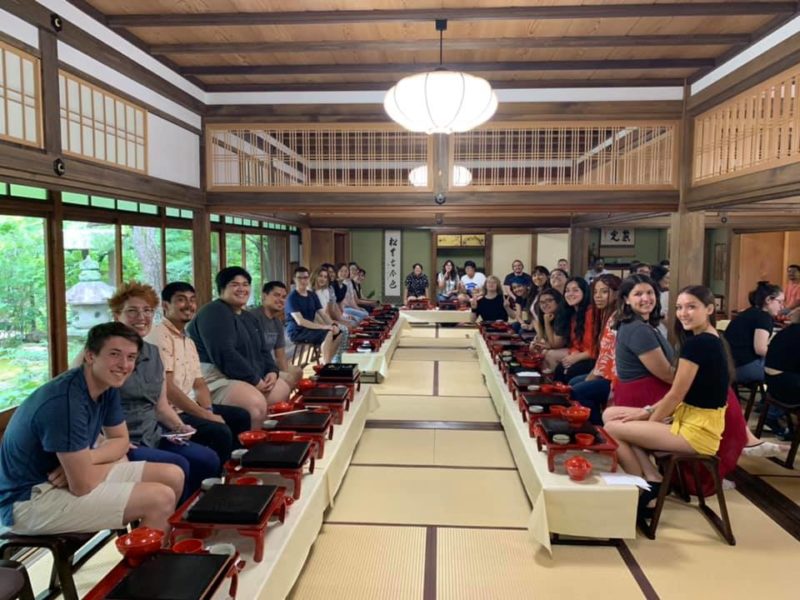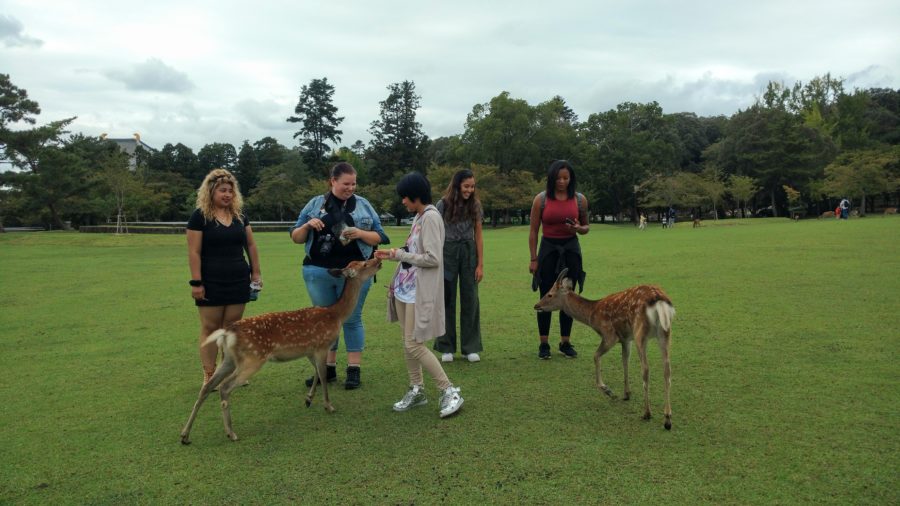Japan is one of AIFS’ newer and rapidly growing destinations for Customized, Faculty-Led programs. With our first groups welcomed in 2018, programs since have ranged for one week to a full semester duration. The Land of the Rising Sun is popular among students and faculty. The country has so much to offer in customs and tradition as well as contemporary culture and technology, and we detail our top ten reasons to study abroad in Japan, below.
Most programs have been based in the Imperial city of Kyoto, considered the heart of Japanese history and culture. A mix of modern and traditional, the Kansai prefecture capital city is also conveniently based for visits to Osaka, Nara and Hiroshima. Tokyo is only 2.5 hours away by bullet train. Home to over twenty colleges and universities, AIFS students can easily blend into the university population and forge local friendship and connections.
Some cultural activities of these programs include traditional tea ceremonies, walking tours, guided tours of castles and temples, and museum visits. Cooking classes, a bamboo forest and monkey park excursion to nearby Arashiyama, pottery making, and introduction to Zazen meditation can also feature. Our summer groups have been lucky to have programs coincide with the Gion Matsuri, one of the most famous festivals in Japan, though various festivals can be found across the country throughout the year. In addition to Kyoto based programs, other popular cities in traveling programs include stops in Tokyo, Hiroshima, Nagasaki and Kanazawa.
Why take a group of students to Japan? Here are 10 of many reasons.
1. A perfect setting for a wide range of disciplines.
Faculty-Led academic courses have included History, Communications and Film Studies and Gender Studies. We have also hosted groups studying Psychology, Creative Writing, and Comparative Health. Japanese language is increasingly popular. Academic field trips to shrines, temples and monuments can be combined with visits to local organizations and cultural centers. Japan is the perfect place to turn the location into your classroom.
2. It’s less expensive than you think.
Japan has a notorious reputation as being extremely expensive. This can be true, but equally, the cost of living can be comparable or cheaper than US standards. For example, local train travel between Kyoto and Osaka (approximately 1 hr) costs around $5 one way. A restaurant ramen is around $8. Entrances to shrines and temples are usually free or less than $5 to visit inside spaces or garden areas. Museums average around $10. Program fees for a faculty-led study abroad program in Japan are comparable to those of a program in Europe.
3. Safety and security.
Japan is one of the safest countries in the world. Violent and petty crime is rare, with Japan ranking last in the number of victims of crime per capita. Beyond this, the hospitality and helpfulness of the Japanese culture is overwhelming.
4. Making local connections.
There are many volunteer guides who are eager to share their city and country with your students. Particularly in Kyoto, there is a volunteer organization of college students who will show visitors around out of a cross-cultural interest. This is a great way to get to know local students and make a true connection to a city, more than a tourist would.
5. Improve your students’ employability.
Study abroad is an impressive part of any resume. A study abroad experience will give them relevant life skills to speak to in job interviews. In fact, in the 2018 AIFS Student Outcomes Survey, 67% of students reported being asked to speak about their study abroad experience in a post-program job interview. Study abroad to a destination such as Japan demonstrates problem solving, creativity and flexibility- all qualities desired in the competitive job market.
6. High standard of living.
Japan has one of the highest standard’s of living in the world. Public transport is easy and far reaching, the streets and parks are clean, and it has a very high level of healthcare.
7. Japanese food.
One of the first things you might hear in Japan is “Itadakimasu!” It is an essential phrase which means “Let’s Eat” but is also an acknowledgement of the gift of food and food preparation. Japanese cuisine has something for everyone- sushi, ramen, tempura, yakisoba, shabu-shabu and the list goes on. Vegetarians and vegans are also well catered for, with tofu and fu, mountain vegetables and Tsukemono (pickles).

8. Variety of activities.
Japan has a lot to offer from Hokkaido to Kyushu– skiing, surfing, hiking, biking for sports enthusiasts, big cities, neon lights and traditional rural villages. Students can pack a lot of different activities into a short amount of time. And travel is a breeze, with high speed trains that are punctual and efficient.
9. Stunning nature, scenery and seasons.
Volcanoes, lakes, hot springs, beautiful coast lines, rice paddies and more are all in easy reach. Each season is also revered in Japan, marked with special food, festivals and ceremonies.
10. Provide a completely new experience for your students.
In short, all aspects of students’ daily lives will be different from what they know. From using public transportation to a language barrier to completely new customs and foods, a program in Japan will challenge your students. The lifestyle and culture will help students open their eyes to new ways of doing almost everything. It will force them to “think out of the box” and adapt, with AIFS support on hand if needed.

AIFS offers customized faculty-led programs in a wide range of locations worldwide.
Click here to request a consultation, our University Relations team will be in touch to help you start the planning process.
